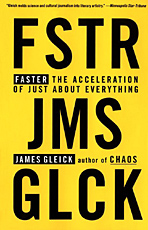"You are bored doing nothing, so you go for a drive. You are bored just driving, so you turn on the radio. You are bored just driving and listening to the radio, so you make a call on the cellular phone. You realize that you are now driving, listening to the radio, and talking on the phone, and you are still bored. Then you reflect that it would be nice if you had time, occasionally, just to do nothing. Perhaps you have a kind of sense organ that can adjust to the slowness, after being blinded by the speed. The void is not so dark after all. With the phone not ringing, the television switched off, the computer rebooting, the newspaper out of reach, even the window shade down, you are alone with yourself. The neurons don't stop firing. Your thoughts come through like distant radio signals finding a hole in the static. Maybe they surprise you; maybe they disturb you; maybe they assemble themselves into longer strands — ideas, or knowledge, that might not have formed in the usual multitasking hurly-burly. . . .
Our idea of boredom — ennui, tedium, monotony, lassitude, mental doldrums — has been a modern invention. The word boredom barely existed even a century ago. To bore meant, at first, something another person could do to you, specifically by speaking, too long, too rudely, and too irrelevantly. Boredom as silence, as emptiness, as time unfilled — was such a mental state even possible? Samuel Johnson, in the eighteenth century, tried hard to believe it was not, for curious creatures such as ourselves. . . .
Maybe boredom is a backwash within another mental state, the one called mania — defined by psychologists as an abnormal state of excitement, encompassing exhilaration, elation, euphoria, a sense of the mind racing. Maybe our hurry sickness is as simple as that. We — those of us in the faster cities and faster societies and faster mass culture of the technocratic dawn of the third millennium C.E. — are manic. The symptoms of mania are all too familiar: volubility and fast speech; restlessness and decreased need for sleep; heightened motor activity and increased self-confidence. Of the possible mental illnesses, mania does not sound like the worst. Anyway, without mania, no boredom? These are the time-obsessions of complex civilizations, populous nation-states with many technologies. In other forms of human society time passes differently."
